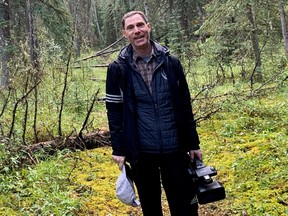Documentary on clearcutting in Canada is being shown in conjunction with the conference on biodiversity.

The documentary begins with what appears to be a commercial for a popular brand of toilet paper, wherein consumers are asked if they can feel the difference in a facial-wipe test between it and a recycled product. They can’t.
So when asked what they would choose after learning the makeups of the two, they all opt for the recycled product.
Sign up to receive daily headline news from the Montreal Gazette, a division of Postmedia Network Inc.
Thanks for signing up!
A welcome email is on its way. If you don't see it, please check your junk folder.
The next issue of Montreal Gazette Headline News will soon be in your inbox.
If only.
The ad is bogus, but the point is well made.
This feature documentary, directed by Montrealer Michael Zelniker, is aptly titled The Issue With Tissue: A Boreal Love Story. It tells a harrowing and compelling story of how large forest landscapes across the Canadian boreal forest are being clearcut for the manufacture of toilet paper and all manner of paper products, and the impact that has had on our Indigenous Peoples. The doc screens at La Cinémathèque québécoise in conjunction with the COP15 conference on biodiversity — beginning Wednesday at the Palais des congrès — and it will resonate with attendees.
Zelniker, 67, had spent part of the pandemic on a 42-day, 15,000-kilometre odyssey from coast to coast in Canada across the boreal regions. He met with more than 50 First Nations elders and leaders, prominent scientists and activists, including Senator Michèle Audette, Dr. Suzanne Simard, the late Dave Courchene, Valérie Courtois and Dr. Nigel Roulet. And long-time environmentalist that he was, even Zelniker came away devastated with his findings.
Last April, Zelniker spent a month in Montreal whittling down 125 hours of interview, landscape and wildlife footage to emerge with this 125-minute cut. It has played at a few festivals already and was shown in Ottawa on Nov. 22 for members of Parliament and senators.
“The video at the beginning was designed to grab people’s attention with satire, but we go on to share a very serious story,” says the L.A.-based Zelniker, in town now for COP15.
“According to our research, about 3 billion trees a year are cut down around the world, and that’s just for paper packaging. It’s not for our clothing, and we use a lot of tree fibre there. And, of course, it’s not for lumber. I don’t even know what the number is in total that we cut down for various products. But when you think about all those Amazon deliveries that we get, that’s where many of those 3 billion trees are going.”
It’s the ripple effect of all this deforestation on wildlife that Zelniker found so staggering. He cites the example of the George River caribou herd in northern Quebec, which was one of the largest of its kind anywhere and which has decreased by 99 per cent.
“Caribou are an indicator species unique to the boreal. It doesn’t take much to figure out that the exponential decline of their numbers in herds in the boreal indicates that the ecosystem is in serious distress. So it’s shocking to learn that Ontario passed a law exempting the logging industry from any of the endangered species regulations.”
The documentary goes on to explore the impact of eco-destruction and its connection to colonization, with Zelniker’s gloves off completely.
“Based on the conversations I had with Indigenous leaders, it became clear that there is a direct line between colonial violence and unfettered extractive industrial exploitation. That was so startling to me. When I started this project, I thought I was just telling a story about trees and toilet paper, but it has evolved and emerged into a much deeper narrative that runs from trees and toilet paper to carbon to climate change to water to birds to caribou to colonization to Indigenous stewardship to the way forward. These were the connections that were made for me.”
Zelniker’s first foray into documentaries has been a labour of love for him. He not only directed but also edited, wrote, produced, shot and financed the doc.
It couldn’t have been more of a contrast than the film, TV and stage performances for which the Dawson College theatre program grad is most known. Standing out among his three dozen credits is his acclaimed work as trumpeter Red Rodney in Clint Eastwood’s Oscar-winning bio-pic Bird. He also won a Genie Award for The Terry Fox Story and appeared in David Cronenberg’s Naked Lunch and the comedy Stuart Bliss, which he also co-produced and co-wrote.
But while Zelniker may be new to docs, he’s no stranger to environmental issues. A member of the Climate Reality Project Leadership Corps, former U.S. vice-president Al Gore’s organization, Zelniker served as co-chair of the Los Angeles Chapter.
“In the first hour of this documentary, we introduce the boreal to people. But I realize that most people in the U.S. and around the world don’t know anything about the boreal. They’ve never even heard of it,” Zelniker notes.
“It is among the most important ecosystems in the world, which we have to protect and conserve. We are all so interconnected, having all emerged from this primordial soup called Mother Earth. What we do to the land we do to ourselves.”
The Issue With Tissue: A Boreal Love Story screens Friday to Dec. 15 at La Cinémathèque québécoise, 335 de Maisonneuve Blvd. E. Check cinematheque.qc.ca/en/ for schedule.
bbrownstein@postmedia.com
twitter.com/billbrownstein
-

COP15 FAQ: Why 20,000 delegates are coming to Montreal to talk nature
-

Mount Royal: Montreal’s wildlife oasis is under threat


